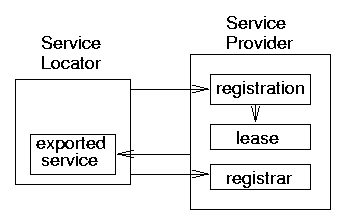
Leasing is the mechanism used between applications to give access to resources over a period of time in an agreed manner
Leases are requested for a period of time.
In distributed applications, there may be partial failures of the network
or of components on this network. Leasing is a way for components to
register that they are alive, but for them to be ``timed out'' if they
have failed, are unreachable, etc.
In Jini, one use of leasing
is for a service to request that a copy be kept on a lookup service
for a certain length of time for
delivery to clients on request. The service requests a time in the
ServiceRegistrar's method register().
Two special values of the time are
Lease.ANY - the service lets the lookup
service decide on the time
Lease.FOREVER - the request is for a lease that never expires
The lookup service acts as the granter of the lease,
and decides how long it will actually create the lease for.
(The lookup service from Sun typically sets the lease time as
only five minutes.)
Once it has done that, it will attempt to ensure that the request
is honoured for that period of time. The lease is returned to the
service, and is accessible through the method getLease()
of the ServiceRegistration object. These objects are shown
in figure 8.1

ServiceRegistration reg = registrar.register();
Lease lease = reg.getLease();
The principal methods
of the Lease object are
package net.jini.core;
public interface Lease {
void cancel() throws
UnknownLeaseException,
java.rmi.RemoteException;
long getExpiration();
void renew(long duration) throws
LeaseDeniedException,
UnknownLeaseException,
java.rmi.RemoteException;
}
getExpiration() is the time in milliseconds
since the beginning of the epoch
(the same as in System.currentTimeMillis()).
To find the amount of time still remaining from the present, the current time
can be subtracted from this:
long duration = lease.getExpiration() - System.currentTimeMillis();
A service can cancel its lease by using cancel().
The lease communicates
back to the lease management system on the lookup service which
cancels storage of the service.
When a lease expires, it does so silently. That is, the lease granter
(the lookup service) will not inform the lease holder (the service)
that it has expired.
While it might seem nice to get warning of a lease expiring so that it
can be renewed, this would have to be in advance of
the expiration (``I'm just about to expire, please renew me quickly!'')
and this would probably be impractical.
Instead, it is upto the service to call renew()
before the lease expires if it wishes the lease to continue.
Jini supplies a class LeaseRenewalManager that looks after
the process of calling renew() at suitable times.
package net.jini.lease;
public Class LeaseRenewalManager {
public LeaseRenewalManager();
public LeaseRenewalManager(Lease lease,
long expiration,
LeaseListener listener);
public void renewFor(Lease lease, long duration,
LeaseListener listener);
public void renewUntil(Lease lease,
long expiration,
LeaseListener listener);
// etc
}
renewFor() or renewUntil().
The time requested in these is in milliseconds.
The expiration time is since the epoch, whereas the
duration time is from now.
Generally leases will be renewed and the manager will function
quietly. However, the lookup service may decide not to renew a
lease and will cause an exception to be thrown. This will be caught
by the renewal manager and will cause the listener's notify()
method to be called with a LeaseRenewalEvent as
parameter. This will allow the application to take corrective
action if its lease is denied.
The listener may be null.
All of the above discussion was from the side of a client that receives a lease, and has to manage it. The converse of this is the agent that grants leases and has to manage things from its side. This section contains more advanced material which can be skipped for now: it is not needed until the chapter on ``Remote Events''. An example of use is given in the chapter on ``More Complex Examples''.
A lease can be granted for almost any remote service, any one where one object wants to maintain information about another one which is not within the same virtual machine. Being remote, there are the added partial failure modes such as network crash, remote service crash, timeouts and so on. An object will want the remote service to keep ``pinging'' it periodically to say that it is still alive and wants the information kept. Without this periodic assurance, the object may conclude that the remote service has vanished or is somehow unreachable, and it should discard the information about it.
Leases are a very general mechanism for one service to have confidence in the existence of the other for a limited period. Being general, it allows a great deal of flexibility in use. Because of the possible variety of services, some parts of the Jini lease mechanisms cannot be given totally, and must be left as interfaces for applications to fill in. The generality means that all the details are not filled in for you, as your own requirements cannot be completely predicted in advance.
A lease is given as an interface
package net.jini.core.lease;
import java.rmi.RemoteException;
public interface Lease {
long FOREVER;
long ANY;
long getExpiration();
void cancel() throws UnknownLeaseException, RemoteException;
void renew(long duration)
throws LeaseDeniedException, UnknownLeaseException, RemoteException;
void setSerialFormat(int format);
int getSerialFormat();
LeaseMap createLeaseMap(long duration);
boolean canBatch(Lease lease);
}
AbstractLease with
subclass a LandlordLease which in turn has a subclass
ConstrainableLandlordLease
A main issue in implementing a particular lease class lies in setting a policy for handling the initial request for a lease period, and in deciding what to do when a renewal request comes in. Some simple possibilities are
Always grant the requested time
Ignore the requested time and always grant a fixed time
There are other issues, though. Any particular lease will need a time-out mechanism. A group of leases can be managed together, and this can reduce the amount of overhead of managing individual leases.
An abstract lease gives a basic implementation of a lease, that can almost be used for simple leases.
package com.sun.jini.lease;
public abstract class AbstractLease implements Lease, java.io.Serializable {
protected AbstractLease(long expiration);
public long getExpiration();
public int getSerialFormat();
public void setSerialFormat(int format);
public void renew(long duration);
protected abstract long doRenew(long duration);
}
Lease interface, with three provisos: firstly, the constructor
is protected,
so that constructing a lease with a specified duration
is devolved to a subclass. This means that lease duration policy must be
set by this subclass. Secondly, the renew() method calls
into the abstract doRenew() method, again to force a
subclass to implement a renewal policy. Thirdly,
it does not implement the methods
cancel() and createLeaseMap(),
so that these must also be left to a subclass.
So this class implements the easy things, and leaves all matters of
policy to concrete subclasses.
The ``landlord'' is a package to allow more complex leasing systems to be built. It is not part of the Jini specification, but is supplied as a set of classes and interfaces. The set is not complete in itself - some parts are left as interfaces, and need to have class implementations. These will be supplied by a particular application.
A landlord looks after a set of leases.
Leases are indentified to the landlord by a ``cookie'',
which is a unique identifier (Uuid) for each lease.
A landlord does not need to create leases itelf, as it can
use a landlord lease factory to do this. (But of course it
can create them,
depending on how an implementation is done.)
When a lease wishes to
cancel or renew itself, it asks its landlord to do it. A client is unlikely
to ask the landlord directly, as it will only have been given a lease, not
a landlord.
The principal classes and interfaces in the landlord
package are shown in figure 8.2 .
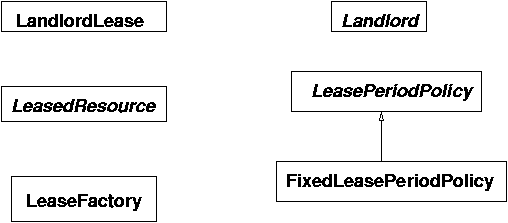
The interfaces assume that they will be implemented in certain ways, in that each implementation class will contain a reference to certain other interfaces. This doesn't show in the interface specifications, but can be inferred from the method calls.
For example, suppose we wish to develop a lease mechanism for a Foo
resource. We would create a FooLandlord to create and manage
leases for Foo objects. A minimal structure for this could be
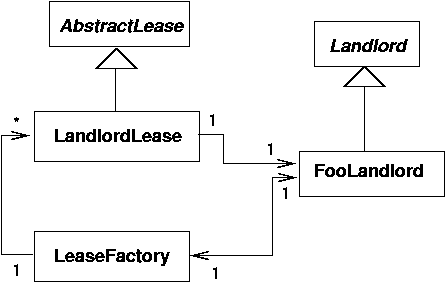
renew() these are passed to the landlord for decisions.
However, when the renew() request to the landlord does
not pass in the lease, but just its uuid.
What is missing from the above simple figure is how the resource itself is dealt with, where leases end up and how decisions are made about whether or not to grant leases or renewals.
Leases are given to the client that is requesting a lease. Calls such
as renew() are remote calls to the landlord. It doesn't
need a copy of the lease, but does need some representation of it.
that is what the cookie is for: a leasor-side representation of the
lease
The resource that is being leased has a representation on the leasor.
For example, a lookup service would have the marshalled form of the
service proxy to manage. The leasor needs to have this representation
plus the lease "handle" (the cookie) and information such as lease
duration and expiration. These are given in an implementation of
the LeasedResource interface
Decisions about granting or renewing leases would need to be made
using the LeasedResource. While these could be made
by the landlord, it is cleaner to hand such a task to a separate
object concerned with such policy decisions. This is the function
of LeasePeriodPolicy objects. For example, the
FixedLeasePeriodPolicy has a simple policy
that grants lease times based on a fixed default and maximum lease
These lead to a more complex class diagram involving the resource and the policy classes:
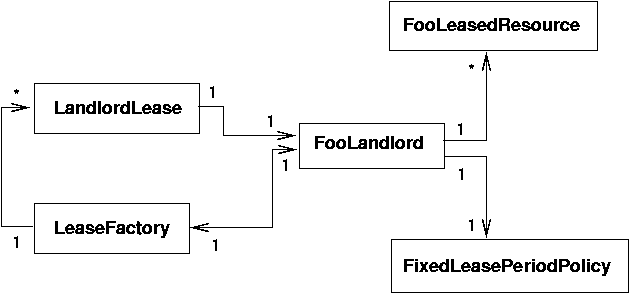
With this as context, we shall now consider some of these classes in more detail.
The class LandlordLease extends AbstractLease.
This has private fields cookie and landlord as shown in
figure 8.5.
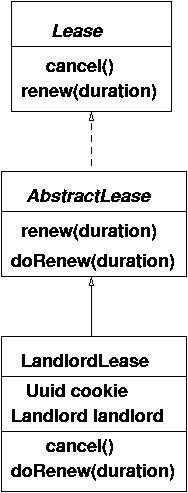
cancel()and doRenew()
is deferred to its landlord.
public void cancel() {
landlord.cancel(cookie);
}
protected long doRenew(long renewDuration) {
return landlord.renew(cookie, renewDuration);
}
A LeasedResource is a convenience wrapper around a
resource that includes extra information and methods for use
by landlords. It defines an interface
public interface LeasedResource {
public void setExpiration(long newExpiration);
public long getExpiration();
public Uuid getCookie();
}
An implementation will typically include the resource that is leased, plus a method of setting the cookie. For example,
/**
* FooLeasedResource.java
*/
package foolandlord;
import com.sun.jini.landlord.LeasedResource;
import net.jini.id.Uuid;
import net.jini.id.UuidFactory;
public class FooLeasedResource implements LeasedResource {
protected Uuid cookie;
protected Foo foo;
protected long expiration = 0;
public FooLeasedResource(Foo foo) {
this.foo = foo;
cookie = UuidFactory.generate();
}
public void setExpiration(long newExpiration) {
this.expiration = newExpiration;
}
public long getExpiration() {
return expiration;
}
public Uuid getCookie() {
return cookie;
}
public Foo getFoo() {
return foo;
}
} // FooLeasedResource
A lease policy is used when a lease is first granted, and when it tries
to renew itself. The time requested may be granted, modified or denied.
A lease policy is specified by the LeasePeriodPolicy interface.
package com.sun.jini.landlord;
public interface LeasePeriodPolicy {
LeasePeriodPolicy.Result grant(LeasedResource resource, long requestedDuration);
LeasePeriodPolicy.Result renew(LeasedResource resource, long requestedDuration);
}
An implementation of this policy
is given by the FixedLeasePeriodPolicy.
The constructor takes maximum and default lease values.
It uses these to grant and renew leases.
The Landlord is the final interface in the package that we need
for a basic landlord system. Other classes and interfaces,
such as LeaseMap are for handling of leases in ``batches'',
and will not be dealt with here. The Landlord interface is
package com.sun.jini.lease.landlord;
public interface Landlord extends Remote {
public long renew(Uuid cookie, long extension)
throws LeaseDeniedException, UnknownLeaseException, RemoteException;
public void cancel(Uuid cookie)
throws UnknownLeaseException, RemoteException;
public RenewResults renewAll(Object[] cookies, long[] durations)
throws RemoteException;
public Map cancelAll(Uuid[] cookies)
throws RemoteException;
}
renew() and cancel() methods are usually called
from the renew() and cancel() methods of a particular
lease. An implementation of Landlord such as FooLandlord
will probably have a table of LeasedResource objects indexed by
the Uuid so that it can work out which resource the request is about.
For any implementation of the Landlord interface,
the methods renewAll() and cancelAll() will clearly
just loop through the cookies and call renew() and cancel()
respectively on each cookie. There is a convenience class
LandlordUtil which has methods renewAll() and cancelAll()
which just do that, saving the programmer having to write the same code for each
implementation. This utility class needs to have an object which implements
just renew() and cancel() and the
LocalLandlord interface has these two methods. So by making our
FooLandlord also implement this interface, we can use the utility
class to reduce the code we need to write.
The landlord won't make decisions itself about renewals.
The renew() method needs to use a policy object to ask
for renewal. In the FooManager implementation it uses a
FixedLeasePeriodPolicy
There must be a method to ask for a new lease for a resource. This is not
specified by the landlord package. This request will probably be made on
the lease granting side and this should have access to the landlord object,
which forms a central point for lease management. So the FooLandlord
will quite likely have a method such as
public Lease newFooLease(Foo foo, long duration);
The lease used in the landlord package is a LandlordLease.
This contains a private field, which is a reference to the landlord itself.
The lease is given to a client as a result of newFooLease(),
and this client will usually be a remote object. This will involve
serialising the lease and sending it to this remote client. While
serialising it, the landlord field will also be serialised and sent to
the client. When the client methods such as renew() are called,
the implementation of the LandlordLease will make a call
to the landlord, which by then will be remote from its origin. So the
landlord object invoked by the lease will need to be a remote object
making a remote call. In Jini 1.2 this would have been done by making
FooLandlord a subclas of UnicastRemoteObject.
In Jini 2.0 this is preferably done by explicitly exporting the landlord
to get a proxy object. In the code that follows this is done using a
BasicJeriExporter (for simplicity) but it would be better to use
a configuration.
Putting all this together for the FooLandlord class gives
/**
* FooLandlord.java
*/
package foolandlord;
import net.jini.core.lease.UnknownLeaseException;
import net.jini.core.lease.LeaseDeniedException;
import net.jini.core.lease.Lease;
import net.jini.jeri.BasicJeriExporter;
import net.jini.jeri.BasicILFactory;
import net.jini.jeri.tcp.TcpServerEndpoint;
import net.jini.export.*;
import java.rmi.Remote;
import java.rmi.RemoteException;
import java.util.Map;
import java.util.HashMap;
import net.jini.id.Uuid;
import com.sun.jini.landlord.Landlord;
import com.sun.jini.landlord.LeaseFactory;
import com.sun.jini.landlord.LeasedResource;
import com.sun.jini.landlord.FixedLeasePeriodPolicy;
import com.sun.jini.landlord.LeasePeriodPolicy;
import com.sun.jini.landlord.LeasePeriodPolicy.Result;
import com.sun.jini.landlord.Landlord.RenewResults;
import com.sun.jini.landlord.LandlordUtil;
import com.sun.jini.landlord.LocalLandlord;
import net.jini.id.UuidFactory;
public class FooLandlord implements Landlord, LocalLandlord {
private static final long MAX_LEASE = Lease.FOREVER;
private static final long DEFAULT_LEASE = 1000*60*5; // 5 minutes
private Map leasedResourceMap = new HashMap();
private LeasePeriodPolicy policy = new
FixedLeasePeriodPolicy(MAX_LEASE, DEFAULT_LEASE);
private Uuid myUuid = UuidFactory.generate();
private LeaseFactory factory;
public FooLandlord() throws java.rmi.RemoteException {
Exporter exporter = new
BasicJeriExporter(TcpServerEndpoint.getInstance(0),
new BasicILFactory());
Landlord proxy = (Landlord) exporter.export(this);
factory = new LeaseFactory(proxy, myUuid);
}
public void cancel(Uuid cookie) throws UnknownLeaseException {
if (leasedResourceMap.remove(cookie) == null) {
throw new UnknownLeaseException();
}
}
public Map cancelAll(Uuid[] cookies) {
return LandlordUtil.cancelAll(this, cookies);
}
public long renew(Uuid cookie,
long extension) throws LeaseDeniedException,
UnknownLeaseException {
LeasedResource resource = (LeasedResource)
leasedResourceMap.get(cookie);
LeasePeriodPolicy.Result result = null;
if (resource != null) {
result = policy.renew(resource, extension);
resource.setExpiration(result.expiration);
} else {
throw new UnknownLeaseException();
}
return result.duration;
}
public Landlord.RenewResults renewAll(Uuid[] cookies, long[] durations) {
return LandlordUtil.renewAll(this, cookies, durations);
}
public LeasePeriodPolicy.Result grant(LeasedResource resource,
long requestedDuration)
throws LeaseDeniedException {
Uuid cookie = resource.getCookie();
try {
leasedResourceMap.put(cookie, resource);
} catch(Exception e) {
throw new LeaseDeniedException(e.toString());
}
return policy.grant(resource, requestedDuration);
}
public Lease newFooLease(Foo foo, long duration)
throws LeaseDeniedException {
FooLeasedResource resource = new FooLeasedResource(foo);
Uuid cookie = resource.getCookie();
// find out how long we should grant the lease for
LeasePeriodPolicy.Result result = grant(resource, duration);
long expiration = result.expiration;
resource.setExpiration(expiration);
Lease lease = factory.newLease(cookie, expiration);
return lease;
}
public static void main(String[] args) throws RemoteException,
LeaseDeniedException,
UnknownLeaseException {
// simple test harness
long DURATION = 2000; // 2 secs;
FooLandlord landlord = new FooLandlord();
Lease lease = landlord.newFooLease(new Foo(), DURATION);
long duration = lease.getExpiration() - System.currentTimeMillis();
System.out.println("Lease granted for " + duration + " msecs");
try {
Thread.sleep(1000);
} catch(InterruptedException e) {
// ignore
}
lease.renew(5000);
duration = lease.getExpiration() - System.currentTimeMillis();
System.out.println("Lease renewed for " + duration + " msecs");
lease.cancel();
System.out.println("Lease cancelled");
}
} // FooLandlord
An Ant file for this is
Leasing allows resources to be managed without complex garbage collection mechanisms.
Leases received from services can be dealt with easily using LeaseRenewalManager.
Entities that need to hand out leases can use a system such as the landlord
system to handle these leases.
If you found this chapter of value, the full book "Foundations of Jini 2 Programming" is available from APress or Amazon .
 This work is licensed under a
Creative Commons License, the replacement for the earlier Open Content License.
This work is licensed under a
Creative Commons License, the replacement for the earlier Open Content License.